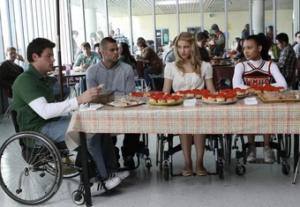55 Glee (2009-2015)
Glee (2009-2015) and the Problems of Discrimination
By Elizabeth Spriggs
Glee was my favorite television show back in 2009 when it first aired. Rewatching it about 8 years later, I noticed some problems with how they portrayed and handled some characters. Glee was created by Ryan Murphy and it touches on different subjects as these kids go through their years of high school. It touches on the struggles of discrimination, religion, disabilities, and the LGBTQ+ community. This show has a lack of understanding with its representation of difference and discrimination. Even though the show does well talking on these subjects, the way they portray and solve them isn’t always all that well done.
Glee is based around a small group of students considered the outcasts of the school. Everyone in the show from main to side characters are all able-bodied. That’s where we hit one of the first disabled characters; we run into Artie. Artie is in a wheelchair from a spinal cord injury leaving him paralyzed from the waist down. This gives him a disadvantage as he can’t perform physically unlike the others in their dance numbers. He is portrayed in an overcoming narrative way, wherein the end he may have just been set up for failure because of his limitation.
In season 1 episode 9, they come across the problem of being unable to get to regionals because the school didn’t offer a handicap bus. Mr. Schuester, the glee instructor, explains how they can’t go to sectionals unless all of them can make it as a team. This left the other members claiming it was unfair to them at first. In each cut, you can see how each character feels by the juxtaposition of wide-angle to medium close-up shots. You can see disappointment as the main emotion amongst his peers, and Artie, you can tell, feels like a burden.

Schuester then brings up an idea to hold a bake sale to raise the proper funds for the bus. The group retaliates by trash-talking bake sales as they aren’t “boujee” enough. Mercedes brings up a point that Artie can just get a ride from his mom. Schuester tells them that they were being insensitive towards a team member, this is when Quinn Fabray steps in saying “Artie understands, don’t you Artie?” During this interaction, we are given a wide-angle shot of Quinn and Artie as she waits for him to agree. Later Mr.Schuester tells the kids that they will be holding the bake sale to be able to afford the bus to get Artie to regionals with them. There is a catch though, each member is told to spend three hours a day in a wheelchair while at school. This, in his hopes, will open their eyes to see how difficult it is for Artie on a daily basis. This is a great way the show has shown a positive look on an issue. It shows that just because someone has a limitation doesn’t mean it holds them back on what they truly love as each member gets a short look into Artie’s life.
Another problem that seems to occur in this episode is when Mr.Schuester brings out the setlist for regionals. Handing out the list the only African-American student in the group, Mercedes, asks why Rachel, the American, gets to sing lead in all of the songs. Mercedes’s face is shown in a wide shot along with 3 of her fellow glee members as she asks why she couldn’t sing lead on some of the songs. The shot then moves to a half-body shot of Mr. Schuester as he looks away uneasily answering her question without once looking up.
During this moment in the episode, the camera switches between Rachel the lead, Kurt the gay best friend, Mr.Schuester, and Mercedes. It starts with a closeup of Rachel who seems to be looking over at Mercedes and then up at Mr.Schuester with an almost blank expression. When Kurt’s shot comes in he shares a quick side glance to Rachel before smiling almost sadly at Mercedes as Mr.Schuester says he is unable to change the setlist to accommodate her “chocolate spice” but instead tells her she can have a lead in the future. The next scene cut is Mercedes as she laughs it off with the rest of her classmates.
Glee is one of those shows that takes real-life problems and turns them into a sort of comedic take. It mainly seems to star white characters with only a few select cast members of minority races. In an article written by Alyssa Rosenberg titled ‘Glee’ is an Immoral Television Show and It’s Time to Stop Watching It says “It’s become a show that’s not just sloppy but exploitative and manipulative of serious societal issues and human experiences” (Rosenberg). When Rosenberg brings this up in her article it makes me think about the two scenes I explained earlier, the screenwriter does well bringing up serious societal and human issues but plays it out in the wrong ways.

Later on in season 2 episode 5 titled “Grilled Cheesus’ ‘ Ryan Murphy brings in the issues of religion. In the episode Finn Hudson, the male lead singer and football player, notices the resemblance of Jesus in his grilled cheese. Finn goes to school telling everyone that they should dedicate the week of songs to Jesus. The first issue we come across is that they are in a public school in which everyone has different views when it comes to religion. In an article written by Nate Hennigan called Glee and Separation of Church and State he says “When the students who are religious all make comments about their own personal religions and faiths, there is generally a mutual respect for everyone. However, when it comes to Kurt’s confession that he does not believe in God, the other students don’t show him the same respect” (Hennagin).
Before this episode, Kurt goes through a troubling time with his dad who had a near-death experience. What also isn’t brought up much is that Kurt’s mother isn’t in the picture as she seemed to have passed on from mysterious causes when he was eight. These have caused Kurt to be an atheist as he has seen no reason to believe in a God. The other characters questioned his choice of belief and treated him with disrespect. Each member of Glee questions Kurt about why he thinks God isn’t real and is expected to explain himself further because everyone else in the room believed in one religion or another. This touches on the topic of how minority religious groups were treated.

Glee is a wonderful musical show that draws the attention of many viewers and has so many strong points throughout its storyline. The way Ryan Murphy chose to touch and portray some serious world problems was just comedic and disrespectful. There is so much within the show that treats a minority group like they’re just tokens. Portrayed like pawns in a chess game where their problems weren’t all that important. It’s interesting to watch how Hollywood seems to show these characters to appeal to younger audiences, but Murphy could have done a way better job at addressing DPD issues.
References
Rosenberg, Alyssa. “’Glee’ Is an Immoral Television Show and It’s Time to Stop Watching It.” ThinkProgress, 2 May 2012, thinkprogress.org/glee-is-an-immoral-television-show-and-it-s-time-to-stop-watching-it-49f7563ba0ac/.
Hennagin, Nate, “Glee and Separation of Church and State.” Americans United for Separation of Church and State, www.au.org/blogs/legislative/glee-and-separation-of-church-and-state.
Sarkeesian, Anita. “Top 5 Problems with Glee: Race, Gender and Sexuality in the Season 2 Premiere.” Feminist Frequency, 22 July 2016, feministfrequency.com/2010/09/23/top-5-problems-with-glee-season-two-premiere/

